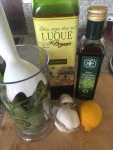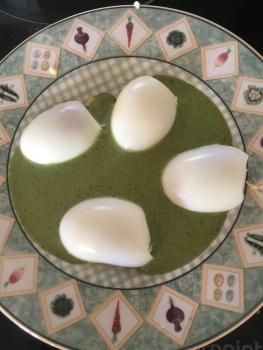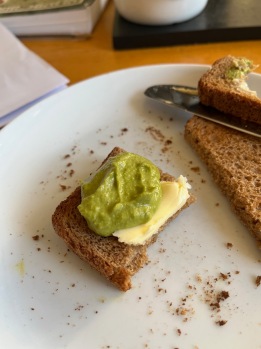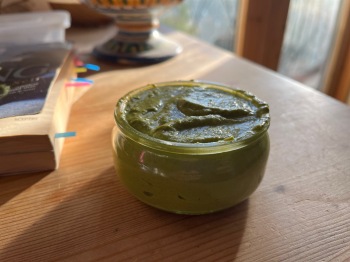
This deliciously green sauce or vinaigrette is versatile in many ways. You can use a variety of fresh herbs or salad leaves such as baby spinach/rocket/chives/dill/ mint, and also combine them. Further versatility comes because the green sauce will zazz up many a dish.
Here it is (see pic) poured over new potatoes. Just cooked, the warm potatoes soak up the fresh, green zinginess.
My idea behind this sauce is to put the greens/herbs centre-stage. They do not merely flavour a vinaigrette but positively overwhelm it. By using the greens raw, you get freshness and taste, and as well as many nutrients as possible because they are not lost by cooking. The raw garlic cloves add further immunity-boosting power, and sparky taste.
I use my trusty blender wand to whizz it all up. About £20, this is an excellent investment, takes up little room in the kitchen and is fab for smoothies.
Raw green herby sauce or vinaigrette

The amounts below are approximate. Natural yogurt is also superb whizzed into this dressing. Or add a spoonful or two of tahini. The greens will produce their own moisture as you whizz it all up, but if you want more liquid, add olive oil – not water , which will make it too watery.
About 50g of fresh herbs/greens
1/2 raw peeled cloves of garlic, roughly chopped (I use 3/4 cloves)
Olive oil 3/4 tablespoons to start
Natural yogurt / 1-2 dessertspoons of tahini (optional)
Balsamic/ lemon juice (half -1 lemon squeezed)
Add the leaves and roughly-chopped garlic to a measuring jug (something with tall sides that will contain the liquid while you whizz). Add in a couple of glugs of olive oil, and start blending. Add natural yogurt or tahini if desired or more olive oil until sauce is creamy and pourable. Add vinegar or lemon juice, and salt to taste.
The sauce is a glorious green colour.
If possible, use organic, or unsprayed, ingredients.
Why organic?
Growing with nature increases a crop’s nutrient content, and thus its taste. Let your taste buds be the judge of this statement, but your brain may be interested to know that an international team led by Newcastle University found organic crops are up to 60% higher in a number of key antioxidants (nutrients) than ones grown the chemical farming way.
There are two reasons for this. One is related to how the soil is fertilised, the second is how plant fights disease.
1) Using factory-made chemical fertiliser draws more water into the plant. The crop may grow quickly but is also more sappy than crops grown with natural fertiliser. Food grown the natural way has more density. (Chemical fertiliser is banned in organic farming, which instead uses biological methods, such as composting and crop rotation, to create healthy soil).
2) Plants naturally produce valuable antioxidants to keep disease and pests at bay (which we in turn benefit from when we eat the plant). When plants are sprayed with pesticides, they produce fewer antioxidants because the chemical spray is doing the work for them. (Killing pests with pesticides is a crude way of protecting a plant because it involves lots of nasty chemicals and kills beneficial insects too, such as bees. The organic way is more creative, using a host of natural and biological methods to keep pests away.).
The way we farm affects the food we eat. You get more carrot for your carrot. In fact, the Newcastle team suggests that switching to organic fruit and vegetables may have the same benefits as adding one or two portions of the recommended “five a day”. Just switching a few of your fave items to organic will add nutritional joy to your life.
So, why not organic your September?

Hard boiled eggs in raw herby vinaigrette sauce
Thank you, my dear acting colleague, Nichola Taylor, from the Barded Ladies, for asking for the recipe.








